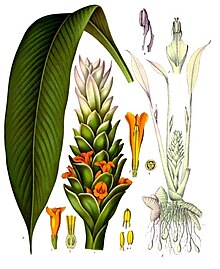Turmeric - Simple English Wikipedia, the free encyclopedia
| Turmeric | |
|---|---|
 | |
| Curcuma longa | |
| Scientific classification | |
| Kingdom: | |
| Order: | |
| Family: | |
| Genus: | |
| Species: | C. longa |
| Binomial name | |
| Curcuma longa | |
Turmeric (Curcuma longa) is a spice, widely used in Asian cooking. It is a rhizomatous herbaceous perennial plant, in the ginger family, Zingiberaceae.[2]
How it grows
[change | change source]Turmeric plants are widely grown in tropical areas of India, where over 70,000 acres are cultivated every year. The plant has long leaves, surrounding spikes where small flowers form. However the root, or ‘rhizome’ of the turmeric plant is harvested, in much the same way as ginger. The turmeric rhizome takes about 10 months to grow before it can be harvested; it is then boiled, cleaned and dried in the sun. Most of the harvested turmeric is ground up and sold in jars for use in cooking, however the fresh root turmeric can also be used.
How it is used
[change | change source]Turmeric is one of the main ingredients of curry powder, and is used to give it the characteristic yellow color. It is also delicious added to rice dishes, seafood, and mustards and pickles. Turmeric is also more widely used as a colorant for textiles and food products. It is sometimes substituted for saffron as it is much less expensive, but produces the same yellow color. Turmeric has also been used as an alternative to medicine and can be made into a drink.
References
[change | change source]- ↑ "U.S. National Plant Germplasm System". npgsweb.ars-grin.gov. Retrieved 2016-09-07.
- ↑ Chan, E.W.C.; Lim, Y; Wong, S; Lim, K; Tan, S; Lianto, F; Yong, M (2009). "Effects of different drying methods on the antioxidant properties of leaves and tea of ginger species". Food Chemistry. 113 (1): 166–172. doi:10.1016/j.foodchem.2008.07.090.


 French
French Deutsch
Deutsch